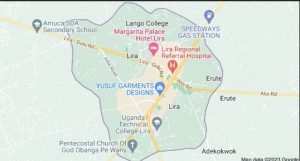More than 75% of used plastic bottles end up in landfills, lakes, and rivers, which is seriously damaging to the environment, according to the Uganda chapter of the World Climate School.
Statistics from the National Environmental Management Authority show that over 600 metric tonnes of plastic are produced every day throughout the country, and given that only 40% of this waste is collected and disposed of properly, the remaining 60% finds its way into the environment.
According to NEMA, 60% of the unregulated plastic waste constitutes the greatest part of the pollution of lakes and rivers, the degradation of soils, the ineffectiveness of fertility and productivity in agriculture, and needless to say, the rampant blockage of drainage channels culminating in the floods we see today.
Lira City is one of the cities in Uganda grappling with waste management, which poses a serious threat to the highly encroached wetlands. According to Tok Power Uganda, an environment advocacy civil society organization, this is a challenge far from being addressed.
https://datawrapper.dwcdn.net/CfFWQ/1/
Lira City Environmental Officer, Leonard Otika, says improper management of plastic bottles within the city has continued to degrade existing wetlands, including Okole Swamp, which surrounds the area both from the east and west, and Ayap Swamp, near the Odokomit trading centre along Kampala Road.
Otika blames this on the mindset of the community for not caring about protecting the environment by, among other things, littering it with bottles.
“Currently, when it rains in Lira City, all the beautiful streets constructed with support from the World Bank a few years ago and wetland experience flooding due to the blockage of the drainage system by ourselves (plastic bottles). The most affected are Oyam Road, Imat Mira Road, Okole, and among others,” says Moses Ogwal, the Executive Director of MPECA Uganda, a local CBO in Lira City.
Ogwal appealed to the authorities of Lira City to allocate more funds in a bid to keep the beauty of the city.
On a daily occurrence, it’s estimated that about 10,000 people use plastic bottles, which end up in our environment, according to the MECPA report.
The effect of poor plastic waste management is not only dangerous to the environment, but also harmful to our health, Ogwal noted.
Susan Adongo, a food vendor along Juba Market, blames the practise on weak laws in place against the community.
In addition, Joshua Ogole, a resident of Ireda Shamba, Lira City Division, expressed fear of the city being flooded in the near future if the matter was not quickly addressed.
“Our leaders have failed to deliver their tasks; all the streets in Lira have no mobile dustbin kits. Therefore, many of us end up joining the crowd, yet we could have been showing people good practice,” Ogole said.
For every 10 bottles people buy in Lira City, only one is recycled, according to environmental experts. This leads to a big threat given the fact plastic bottles do not decompose easily; it takes up to about 1,000 years for every single bottle to disintegrate, leading to pollutants in our soil and environment.
Leslie Ojom Nek, a public health expert in Lira, said shameless disposal of plastic bottles is not only dangerous to wetland but also poses big health risks in the community.
Video on the Effect https://www.youtube.com/watch?v=G8MO_8Zfu3Q
Jackson Etwop, a local social resident said most of the garbage management kits that were earlier planted within the city with funds from USMID have been spoiled, a move he claimed has escalated improper waste disposal.
“Imagine Lira being a small city, but they have failed to manage garbage. What will happen if the population increases?” Etwop asked.
Agustine Otim, a local environmental activist, suggested recycling as the immediate solution to poor disposal of bottles.
“We should embrace urban farming using plastic bottles for irrigation,” Otim said.
In the western world, plastic materials can also be used for making bags, caps, and so many other items; therefore, the jobless youth should see this as an opportunity to help make our city.
Sarah Awor, the female councillor of Lira City, who recently led a demonstration protesting poor garbage management within Lira City, wants mobile garbage kits installed on major streets. https://soundcloud.com/jimmy-olot/awor-shara-the-female-workers-councilor-on-plastic-
Meanwhile, Mayor Sam Atul says the city will allocate more funds and put a fine on those who will be found throwing trash anyhow.
Lira became a city in 2020; according to officials, it is estimated that the city is home to over 300,000 people; politically, the city has three members of parliament, namely, the woman MP and two divisional MPs with two divisions.

In 2022, the ultimate media, in attempt to escalate campaign against environmental degradation trained and equipped several journalists around the country to report on the vice.
The writer is Jimmy Krapf Olot, a journalist based in Lira City, Northern Uganda.
